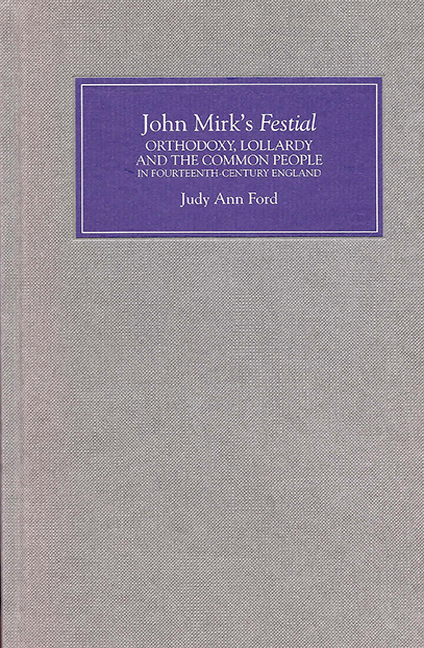Book contents
- Frontmatter
- Acknowledgements
- Contents
- Introduction: John Mirk's Festial and Fourteenth-Century England
- 1 Popular Culture and the Study of Late Medieval Piety
- 2 Clerical Power and Lay Agency
- 3 Secular Authority and Rebellion
- 4 Biblical Authority and Oral Tradition
- Conclusion: The Festial and Popular Piety in Late Medieval England
- Bibliography
- Index
Conclusion: The Festial and Popular Piety in Late Medieval England
Published online by Cambridge University Press: 11 May 2017
- Frontmatter
- Acknowledgements
- Contents
- Introduction: John Mirk's Festial and Fourteenth-Century England
- 1 Popular Culture and the Study of Late Medieval Piety
- 2 Clerical Power and Lay Agency
- 3 Secular Authority and Rebellion
- 4 Biblical Authority and Oral Tradition
- Conclusion: The Festial and Popular Piety in Late Medieval England
- Bibliography
- Index
Summary
A close reading of Mirk's sermons indicates that his writing of the Festial was motivated by a desire to dissuade the masses from Lollardy and revolt by providing an avenue of vernacularity, lay agency, and participatory ecclesiology within the orthodox church. The Festial does not attempt to persuade its audience through the means of direct, didactic instruction grounded upon the presumed authority of the clergy who speak its words. Instead, Mirk adopts a more subtle approach: his sermons use narrative to convey their message. He appeals to a popular audience by speaking their language, not only literally – by using the English vernacular – but also metaphorically – by relying on exempla, on story-telling. Moreover, he appeals to the laity by vesting the lay characters in his stories with agency and a degree of spiritual autonomy.
The notion that Mirk's Festial was composed as an anti-Lollard work is not new, but it has been dismissed by scholars. In 1987 Alan Fletcher speculated that Mirk's motivation in writing the Festial was, in part, a desire to counteract the popularity of Wyclif, writing:
There may be nothing quite so effective as the scent of heresy to precipitate the orthodox establishment into motion, and perhaps we should suggest, without at all denying the more straightforward ‘defaute of bokus,’ that he was also conscious of a need to help arm the Church against a spiritual threat.
Upon finding only two direct references to the Lollards in the entire collection, Fletcher concluded that there was not sufficient evidence to support his speculation. He retreated to the much weaker conclusion that at ‘the very least, the Festial should be regarded as the product of the same decade as saw the public condemnation of Wycliffe and the growing unease of the orthodox establishment with the content and implications of Wycliffite thought.’ Two years later A. I. Doyle also claimed that the Festial was intended to counter Lollardy because its area of heaviest distribution corresponded with that of the Wycliffite sermon cycle. The notion was discounted by Susan Powell in 1998 in her short book on the Festial:
… if it were the case, it seems to me that the Festial would incorporate more explicit references to Lollardy and greater insistence on orthodox theology than it does.
- Type
- Chapter
- Information
- John Mirk's FestialOrthodoxy, Lollardy and the Common People in Fourteenth-Century England, pp. 143 - 150Publisher: Boydell & BrewerPrint publication year: 2006



